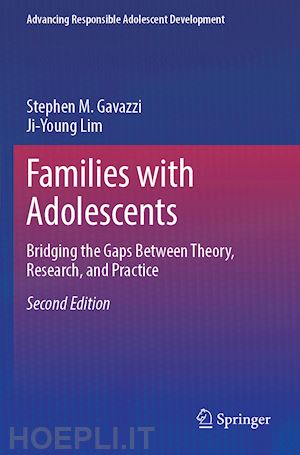

Questo prodotto usufruisce delle SPEDIZIONI GRATIS
selezionando l'opzione Corriere Veloce in fase di ordine.
Pagabile anche con Carta della cultura giovani e del merito, 18App Bonus Cultura e Carta del Docente
The second edition of this book offers an expanded and updated blueprint for more consistently improved practice, emphasizing family process and structure instead of only individual developmental stages. Its chapters deftly summarize the recent knowledge base about families with adolescents and explains how to apply these results across mental health and social services disciplines. The new edition clearly illustrates family concerns and theoretical perspectives through real-world vignettes and cogent use of family assessment measures. Chapters offer a broad understanding of how diversity in all its forms – including race/ethnicity, culture, religion, and sexual orientation – has created a much more nuanced understanding of how families with adolescents are able to function within their environment. Both major challenges to families and communities form the backdrop of the second edition’s focus on forecasting in which the theoretical, empirical, and intervention literatures necessarily move in service to the health and well-being of families with adolescents.
Featured topics include:
Families with Adolescents, Second Edition, is an essential resource for researchers, professors, and graduate and advanced undergraduate students as well as professionals and other mental health clinicians, practitioners, and therapists in clinical child and developmental psychology, family studies, human development, sociology, social work, education, and all allied disciplines.
Part 1. Introduction and Overview of Theoretical, Research, and Application Topics.- Chapter 1: Introduction to Families with Adolescents.- Chapter 2: Overview of Theory, Research, and Application Topics in Families with Adolescents.- Part 2. Theorizing About Families with Adolescents.- Chapter 3: Family Development Theory.- Chapter 4: Family Systems Theory.- Chapter 5: Ecological Theory in Family with Adolescents Studies.- Chapter 6: Attachment Theory in Family with Adolescents Studies.- Chapter 7: Social Learning Theory in Family with Adolescents Studies.- Part 3. Research on Families with Adolescents.- Chapter 8: Research on the Parent-Adolescent Dyad.- Chapter 9: Polyadic Research on Families with Adolescents.- Chapter 10: The Family’s Impact on Adolescent Outcomes.- Part 4. Application Topics Concerning Families with Adolescents.- Chapter 11: Family Therapy and other Family Intervention-Based Efforts with Adolescents.- Chapter 12: Prevention Programs for Families with Adolescents.- Part 5. Future Directions in Families with Adolescents Research and Practice.- Chapter 13: Outlook on Theoretical, Research, and Application Efforts in Families with Adolescents.- Chapter 14: The Need to Integrate Theory, Research, and Application Efforts in Families with Adolescents.
Stephen M. Gavazzi, Ph.D., is Professor, Department of Human Sciences, and Director of CHRR at The Ohio State University. During the past 30 years at Ohio State, Dr. Gavazzi has established a research program that identifies the impact of family dynamics on youth development, psychopathology, and problem behavior. This work has been supported by more than $5 million in grants from a wide variety of federal, state, and private sources. He also is a trained Family Therapist, thus bringing an applied clinical perspective to his work. Dr. Gavazzi has been involved in the development and evaluation of a number of family-based programming efforts, including a multifamily psychoeducational group for families containing children with mood disorders, as well as a strength-based program for families who have adolescents involved in some aspect of the juvenile court. Notably, he provided leadership in the development of the Global Risk Assessment Device, a web-based instrument designedto generate information that assists professionals in making appropriate service referrals for at-risk youth and their families.
Dr. Ji-Young Lim, Ph.D., is a Professor in the Department of Child and Family Studies at Kyungpook National University in South Korea. Dr. Lim embarked on a rewarding and impactful professional journey with a Ph.D. in Human Development and Family Science (HDFS) from The Ohio State University, where she also minored in Quantitative Psychology. Her career began as an Assistant Professor at the Department of Family Studies and Social Work at Miami University. Over the past 17 years, Dr. Lim has diligently employed diverse quantitative research methods to delve into various facets of children and adolescents within diverse family contexts. Notably, she played a significant role in validating the Korean Version of Rothbart's Temperament scales, a project funded by the Korea Research Foundation. Her research efforts have shed lighton child and adolescent development within multicultural families in South Korea. Dr. Lim's dedication to rigorous scholarship is evident through her extensive publication record, which boasts over 100 papers published in peer-reviewed journals.











Il sito utilizza cookie ed altri strumenti di tracciamento che raccolgono informazioni dal dispositivo dell’utente. Oltre ai cookie tecnici ed analitici aggregati, strettamente necessari per il funzionamento di questo sito web, previo consenso dell’utente possono essere installati cookie di profilazione e marketing e cookie dei social media. Cliccando su “Accetto tutti i cookie” saranno attivate tutte le categorie di cookie. Per accettare solo deterninate categorie di cookie, cliccare invece su “Impostazioni cookie”. Chiudendo il banner o continuando a navigare saranno installati solo cookie tecnici. Per maggiori dettagli, consultare la Cookie Policy.